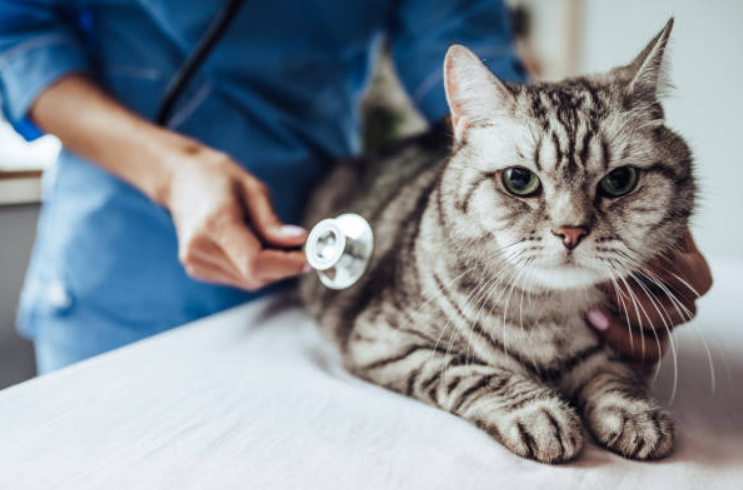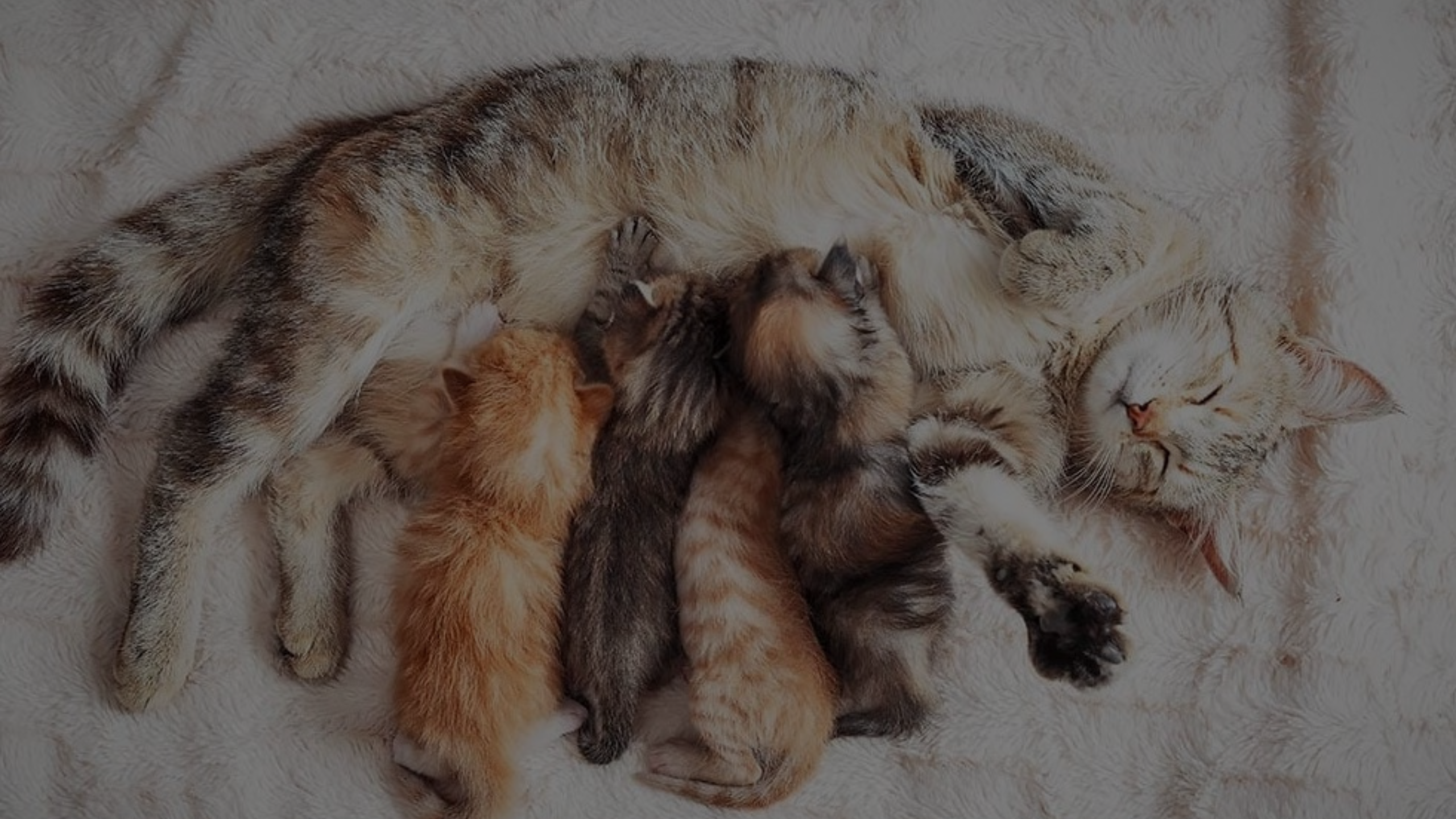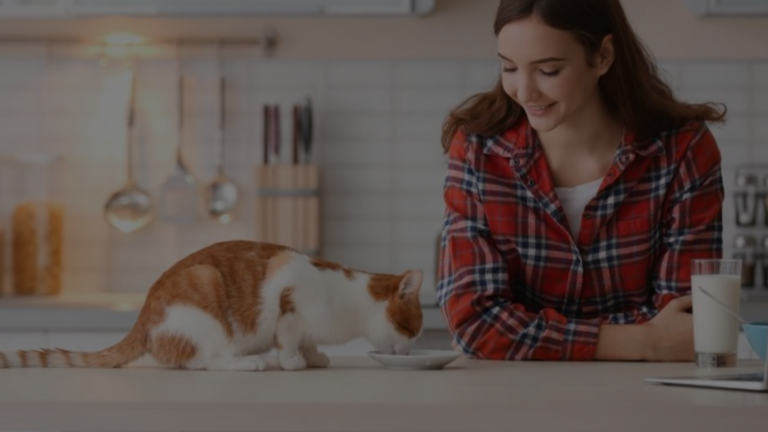Have you ever witnessed a tiny kitten nuzzling and kneading against a seemingly unfazed, spayed cat, attempting to nurse? This adorable, yet surprising, behavior is more common than you might think. While a spayed cat’s milk production is significantly reduced, the instinct to nurse and the bond between mother and kitten can persist long after the weaning period.

Why a kitten try to nurse on a spayed cat? The answer lies in a combination of factors:
Reasons Why a Kitten Might Nurse on a Spayed Cat
Instinctive Behavior
From their first moments, kittens rely on their mother’s milk for life-giving nourishment. It’s not just about calories; it’s a cocktail of antibodies and nutrients that build their immune systems and help them grow strong. But it’s more than just sustenance – the act of suckling itself triggers a cascade of hormones in both mother and kitten.
It’s a soothing symphony of oxytocin, the love hormone, and prolactin, the milk-making hormone. Even in spayed cats, with their milk production significantly reduced, these hormonal echoes can linger, creating a familiar and comforting experience for both.

Think of it like a human infant sucking its thumb after weaning. It’s not about the nourishment, it’s about the comfort, the familiar sensation, and the reassurance of a bond that runs deep. So, when you see a kitten nuzzling and kneading against its spayed mother, even though the milk may not flow, remember – it’s a symphony of instincts, a testament to the enduring power of love and comfort, playing out in the tiniest of paws and the softest of purrs.
Interrupted Weaning
Tiny kittens, like little warriors, need Mom’s milk and cuddles to grow strong. Sometimes, they get separated too early, missing out on learning to eat big cat food. Even though Mom can’t make much milk anymore after surgery, seeing the kitten nervous might make her let it snuggle and knead for comfort, like an old, happy memory.
It’s not about food, but about love and feeling safe, just like a scared soldier finding comfort in a friend’s touch. Even without milk, it’s a sweet reminder of the special bond between mothers and kittens.
Comfort and Bonding
The tiny paw kneading, the gentle purring, the soft mewls… Nursing isn’t just a pit stop for a hungry kitten, it’s a love language. Like a warm hug at the end of a long day, nursing releases a flood of feel-good hormones for both kitten and cat, building a bridge of closeness that even surgery can’t sever.
Even though Mom’s milk may have dried up, the act of suckling itself is a powerful comfort. It’s like a cozy blanket, a familiar routine, a silent promise of “I’m here for you.” Think of a grown cat kneading a soft blanket or lovingly pawing at a plush toy – the same instinct lives on. It’s not about the milk, it’s about the connection, the feeling of being safe and loved in a purring world.

So, when you see a kitten nursing on a spayed cat, know that it’s more than just biology. It’s a whisper of love, a purring lullaby, a reminder that even the tiniest paws can weave magic, knitting bonds that last a lifetime.
Lack of Alternatives
Life throws some tough paws at kittens – no siblings, no Mama’s milk, just a world spinning too fast. But even then, they find solace in unexpected places. A spayed cat, though milkless, becomes a beacon of warmth, a rhythmic purr a lullaby against the unknown.
Like a castaway clinging to a raft, the kitten finds comfort in another’s fur, a whispered promise of “You’re not alone.” It’s not just nursing, it’s resilience and purring warmth, the magic of finding comfort in the unexpected.
What to Do if a Kitten Tries to Nurse on a Spayed Cat
Monitoring a Kitten Trying to Nurse on a Spayed Cat

While the sight of a kitten attempting to nurse a spayed cat is heartwarming, it’s crucial to remember that their health and well-being remain the top priority. Here’s what you can do to ensure your tiny friend thrives:
Food First:
- Kitten Chow Down: Even though the instinct to nurse lingers, the kitten needs a reliable source of food to grow and thrive. Ensure they’re offered age-appropriate kitten food regularly. Watch for them actively eating and gaining weight steadily.
- Milk Alternatives: If the kitten seems particularly hungry or distressed, consider offering warm milk replacement formula. Consult your veterinarian for the appropriate type and feeding schedule.
Vet Check-Up:
- Wellness Watchdog: Schedule regular check-ups with your veterinarian to monitor the kitten’s overall health and development. This is especially important if they’re not eating well or showing any signs of malnutrition, such as lethargy, dull fur, or weight loss.
- Vaccinations and Parasite Prevention: Don’t forget essential kitten vaccinations and parasite prevention medication to keep them healthy and protected.
Comfort and Companionship:
- Warmth and Cuddles: Provide a cozy, warm environment for the kitten, complete with soft bedding and ample cuddles. This will help them feel secure and comforted, especially if they’re missing their mother or littermates.
- Playful Paws: Engage the kitten in interactive playtime with toys and gentle petting. This helps stimulate their senses, build confidence, and prevent boredom.
- Double Dose of Love: If possible, consider introducing a playful companion cat or providing access to other friendly animals. The social interaction can be invaluable for the kitten’s emotional well-being.
Providing Alternatives for Kittens Nursing on Spayed Cats

Seeing a kitten nuzzling and kneading at a spayed cat’s belly can be a heartwarming sight, but it’s also a reminder to ensure their well-being. Don’t worry, this adorable behavior doesn’t require drastic measures, but it does call for some thoughtful care! Here are some ways to provide alternatives and keep your little purr-ball content:
Milk Magic (if needed):
- Hungry Heartache: If the kitten seems distressed or isn’t eating well, offering warm kitten milk replacement formula can provide temporary comfort and nourishment. Consult your vet for the right type and feeding schedule.
- But Food First: Remember, formula is a supplement, not a primary source of food. Ensure the kitten is eating age-appropriate kitten food regularly for proper growth and development.
Snuggle Sanctuary:
- Cuddle Craving: Kittens thrive on warmth and security. Create a cozy haven with soft bedding and plenty of snuggle time. A warm water bottle wrapped in a towel can mimic Mom’s comforting heat.
- Plush Pals: Soft toys and blankets can become surrogate cuddlers, offering comfort and a familiar outlet for the kitten’s kneading instinct.
Playful Purrs:
- Engaging Entertainment: Interactive playtime with gentle toys and positive reinforcement is crucial for building confidence and preventing boredom. Feather wands, crinkly balls, and scratching posts are great options.
- Feline Friends: If possible, introducing a playful companion cat or supervised interaction with gentle adults can significantly benefit the kitten’s social and emotional development.
Human Hugs:
- Gentle Giants: Don’t underestimate the power of gentle petting and lap time. Positive human interaction fosters trust and provides crucial emotional support, especially for orphaned or rescued kittens.
- Monitoring Matters: While the nursing behavior is usually harmless, keep an eye on the kitten’s overall health. Consult your veterinarian if they show signs of malnutrition, lethargy, or other health concerns.
You may also check these articles:
Helping Kittens Move On From Nursing on Spayed Cats

While the sight of a tiny kitten nuzzling and kneading at a spayed cat’s belly is undeniably adorable, it’s also a reminder that their development needs careful attention. Remember, patience and understanding are key when navigating this natural yet potentially confusing behavior.
Growth Over Grumbling:
- Outgrowing the Urge: The good news is, this behavior is temporary! As the kitten matures and becomes fully weaned, the urge to nurse will naturally fade. Focus on providing age-appropriate kitten food and ensuring they’re gaining weight steadily.
- Gradual Steps: Don’t try to stop the nursing behavior abruptly. This can be stressful for both the kitten and the cat. Instead, offer gentle distractions like toys or playtime during their attempts to nurse.
Cuddle, Don’t Scold:
- Instinct Over Inappropriate: Remember, nursing is a deeply ingrained instinct in kittens. Scolding or punishing them for this natural behavior is not only ineffective but also harmful to their emotional well-being.
- Comfort Craving: Instead of reprimanding, offer alternative sources of comfort like soft blankets, warm cuddles, and gentle playtime. This approach builds a trusting bond and helps the kitten transition naturally.
Purrfect Playtime:
- Distraction with Delight: Interactive playtime with toys and activities is a fantastic way to divert the kitten’s attention from trying to nurse. Encourage playful pounces, feather chases, and gentle wrestling sessions.
- Social Butterfly Bonus: If possible, consider introducing a playful feline companion. Social interaction with other cats can be incredibly enriching for the kitten’s development and can provide an alternative outlet for their cuddling and kneading instincts.
Monitoring Matters:
- Eyes on the Prize: While the nursing behavior is usually harmless, keep an eye on the kitten’s overall health. Consult your veterinarian if they show signs of malnutrition, lethargy, or other health concerns.
- Open Communication: Don’t hesitate to discuss your concerns with your vet. They can provide valuable advice and guidance on ensuring your kitten is thriving, both physically and emotionally.
Kitten Cuddles: Why They Nurse on Spayed Cats (and What to Do)
Ever seen a tiny paw kneading a spayed cat’s belly? Don’t fret – it’s natural! Even without milk, kittens sometimes try to nurse for comfort and a familiar motherly bond.
Why?
- Strong instincts: Nursing is deeply ingrained, even with reduced milk.
- Disrupted weaning: Early separation can make them seek comfort.
- Cuddles and warmth: It’s not just food, it’s about feeling safe and loved.
What to do?
- Feed them well: Make sure they’re eating kitten food and gaining weight.
- Offer cuddling alternatives: Soft toys, blankets, and gentle playtime can help.
- Be patient: This behavior will fade as they grow older.
Remember: It’s harmless, but monitor their health and show them extra love!
So next time you see a furry cuddle monster nuzzling a spayed cat, smile and know – it’s just the perfect way for a tiny kitten to say “I love you.”
FAQs: Why a Kitten Tries to Nurse on a Spayed Cat
Why would a kitten nurse on a spayed cat, who doesn’t have milk?
Even though milk production is significantly reduced after spaying, the urge to nurse is deeply ingrained in kittens. It’s about more than just nourishment; it’s a powerful comfort mechanism and a way to strengthen the mother-kitten bond. The act of suckling releases oxytocin, the love hormone, in both kitten and cat, creating a warm and soothing experience.
Is it harmful for a kitten to nurse on a spayed cat?
In most cases, no! As long as the kitten is also eating age-appropriate kitten food and gaining weight normally, the occasional attempt to nurse on a spayed cat is harmless. It’s simply an instinct to seek comfort and reassurance.
What could be causing the kitten to seek out nursing even when there’s no milk?
Early separation from their mother or littermates can disrupt a kitten’s natural weaning process, making them crave the comfort and security that nursing provides. Additionally, the familiar warmth and purring of a cat can be a source of solace for any kitten, regardless of whether they nurse or not.
Should I discourage the kitten from trying to nurse on the spayed cat?
Generally, it’s best to avoid scolding or reprimanding the kitten for this natural behavior. Instead, offer gentle distractions like toys or playful interactions to divert their attention. Focus on ensuring the kitten has plenty of alternative sources of comfort, such as soft bedding, cuddles with you, and playtime with other friendly cats.
When will the kitten outgrow this behavior?
As the kitten matures and becomes fully weaned (usually around 12-16 weeks old), the urge to nurse will naturally fade. Be patient and provide them with a loving and supportive environment. Remember, their well-being is the top priority!
Should I be concerned if the kitten seems distressed or isn’t eating well?
While the nursing behavior itself is usually harmless, it’s crucial to monitor the kitten’s overall health. If they’re showing signs of malnutrition, lethargy, or other health concerns, consult your veterinarian for advice and ensure they’re getting proper nutrition.




![Putting Cat in Carrier as Punishment [Cat Behavior Tips]](https://petsybox.com/wp-content/uploads/2023/09/Putting-Cat-in-Carrier-as-Punishment-Featured-Images-768x432.webp)


